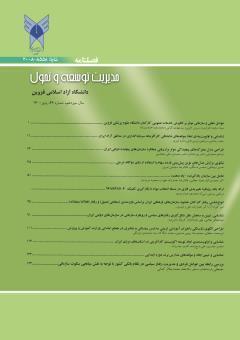Exploring and Ranking the Antecedents and Consequences of Shared Leadership in Educational System
Subject Areas : مدیریتReza Maroufi 1 , Kaveh Teymournejad 2 * , Mohammad javad Kameli 3
1 - PhD student of Public Administration, Qazvin Branch, Islamic Azad University, Qazvin, Iran.
2 - Department of Public Administration, Central Tehran Branch, Islamic Azad University, Tehran, Iran.
3 - Department of HR, Faculty of Organizational Resource, Law Enforcement Sciences University, Iran, Tehran
Keywords: Antecedents, Consequences, Shared Leadership Style, Educational System.,
Abstract :
The purpose of this study was to explore and rank the antecedents and consequences of shared leadership style in the educational system. This research is applied in terms of purpose, and from a typological point of view, is a mixed exploration study with inductive approach. The statistical population of the quantitative part is the professors and faculty members of the Islamic Azad University of West Azerbaijan, which were determined 26 people with the convenience sampling strategy. The data gathering tool in the qualitative section is semi -structured interview and in the quantitative part, is the questionnaire. Interviews were analyzed using theme analysis method and MAXQDA2020 software, and questionnaires by using the fuzzy Delphi Method and Excel software. Findings show that Shared leadership antecedents including the 11 categories: increased environmental complexity, shared perspective, educational technological changes, transformational university creation, need for dynamic flexibility, faculty members empowerment, Collectivism of Decision -making and reduction of power distance, team Idealization, change in organizational structure, personality traits, and leader communication traits. In addition, the shared leadership Consequences include: enhancing participate and participation, improving group decision -making, increasing creativity and innovation, accountability and responsibility, access to entrepreneurial university, increased productivity, credibility and reputation of university, Improvement of organizational engagement and commitment, increasing job passion of employee and faculty members, increase citizenship behaviors, promote psychological well -being. Among the shared leadership antecedents, the highest rank is increase environmental complexity and among the consequences, the highest rank is promote participate and participation.

